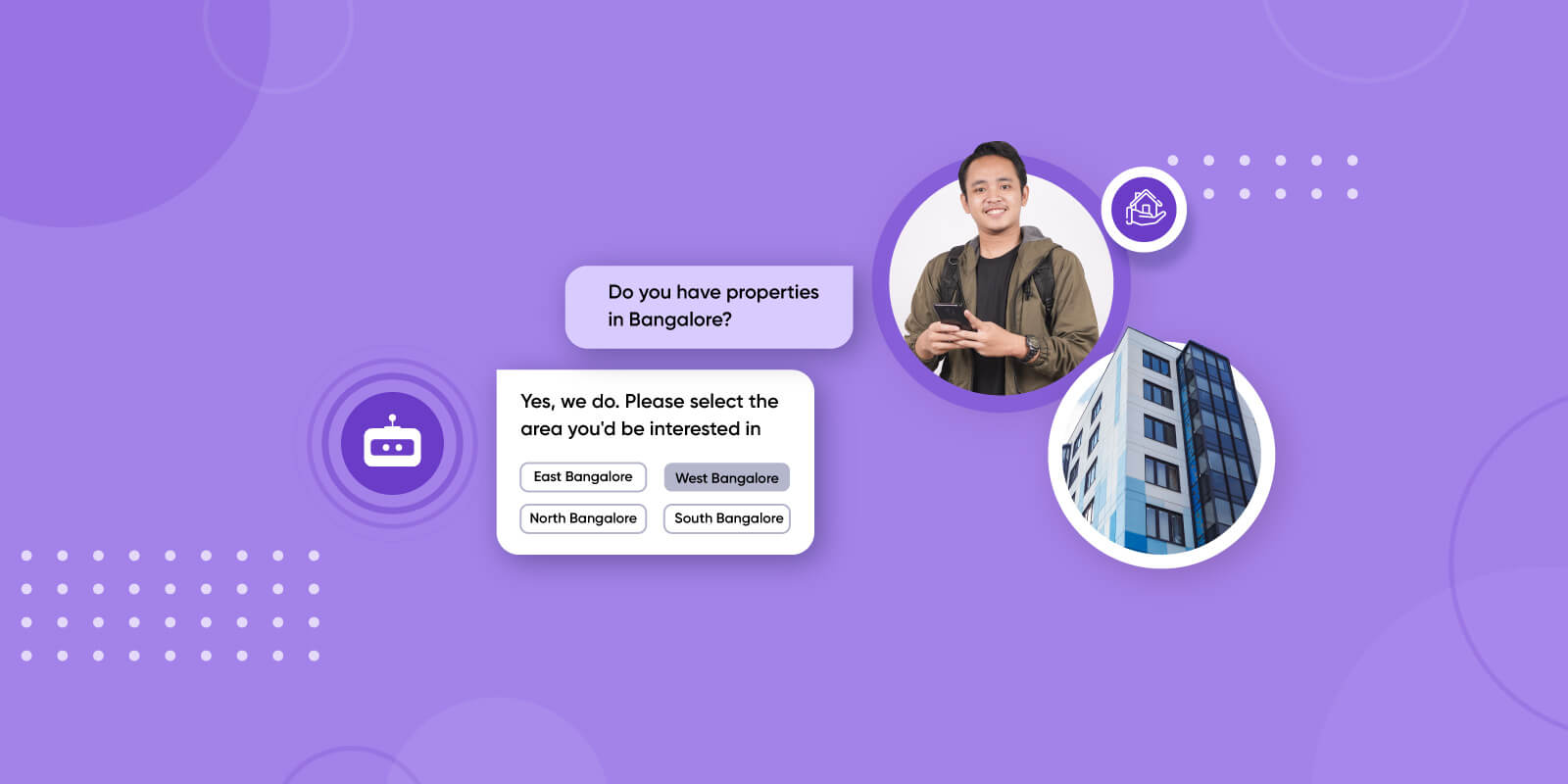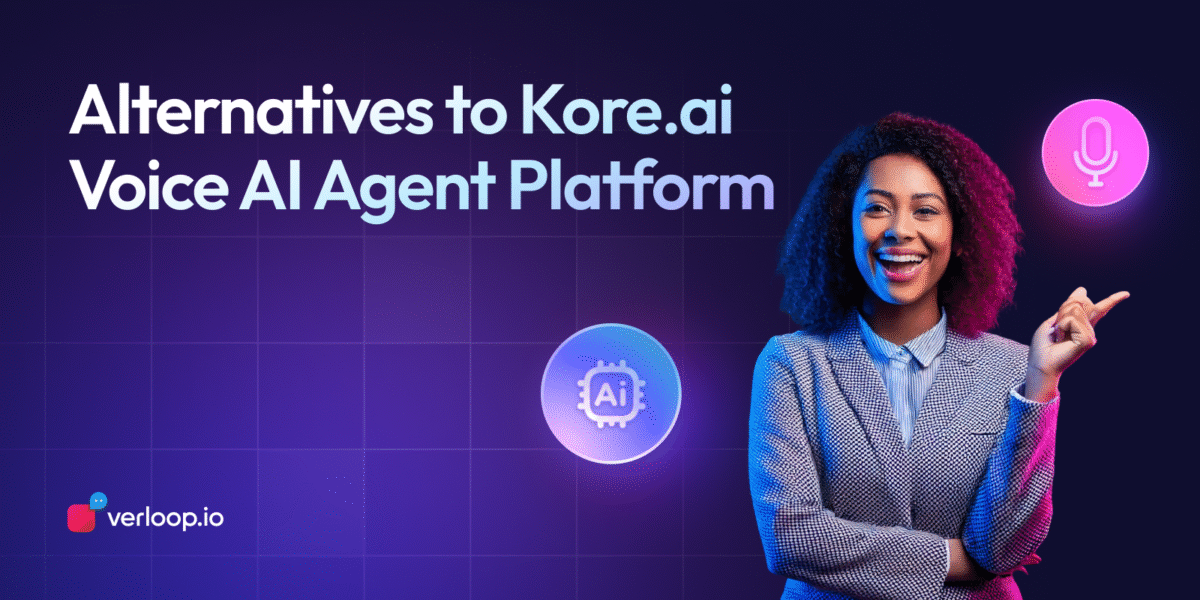AI in Real Estate: Build Meaningful Bond with Customers
- July 25th, 2025 / 5 Mins read
-
 Aarti Nair
Aarti Nair

AI in Real Estate: Build Meaningful Bond with Customers
- July 25th, 2025 / 5 Mins read
-
 Aarti Nair
Aarti Nair
For years, real estate has stood on the sidelines of digital transformation—watching fintech, retail, and healthcare leap ahead with AI, automation, and data-driven decision-making. While the industry had its first wake-up call during the pandemic, when physical restrictions forced digital adoption, what’s unfolding now with Generative AI (Gen AI) feels like a second, much larger wave.
And this time, it’s not just about going digital—it’s about getting smarter.
Gen AI is maturing at a pivotal moment for real estate. Industry players—whether developers, investors, or operators—are sitting on a goldmine of data: lease terms, market trends, tenant behaviour, property records, environmental conditions, and even community insights. Until now, much of this information remained underused or siloed. But with Gen AI’s ability to summarise, personalise, and generate, that data can be transformed into action—at scale.
What’s exciting is how tailored this technology can be. When trained on real estate–specific data, Gen AI doesn’t just spit out generic insights. It can:
-
Flag underpriced assets in emerging locations
-
Auto-generate listing descriptions or tenant communications
-
Optimise interior layouts or building designs based on buyer personas
-
And even guide complex negotiations with personalised, AI-powered coaching
In fact, McKinsey estimates that Gen AI could unlock $110 billion to $180 billion in value for the real estate sector. That includes gains from increased operating income, tenant retention, customer satisfaction, new revenue streams, and smarter capital allocation.
But here’s the catch:
Most real estate businesses aren’t there yet.
While Gen AI has created plenty of buzz, many companies are still grappling with how to deploy it meaningfully. Adopting a foundational model is easy. Extracting competitive advantage from it? That’s where things get messy.
This blog explores how Gen AI can solve real-world real estate challenges—through what McKinsey calls the “Four Cs”:
Customer engagement, Creation, Concision, and Coding.
We’ll walk through use cases across sectors—from tenant experience and leasing workflows to asset selection and workforce optimisation—and spotlight actionable ways the industry can finally step into the future it’s been promised.
Because for real estate, this isn’t just a technology play.
It’s a once-in-a-generation opportunity to reinvent what value looks like.
The Four Cs of Gen AI in Real Estate
To understand where Gen AI adds the most value in real estate, it helps to break down its capabilities into four broad categories—what McKinsey calls the Four Cs:
Customer engagement, Creation, Concision, and Coding.
Each unlocks different types of use cases, from streamlining operations to elevating customer experiences and unlocking entirely new business models.
Let’s look at what each “C” means in action.
1. Customer Engagement: AI That Talks, Learns, and Closes
Real estate has traditionally been a people-driven business. But in a world of remote viewings, self-service tenants, and digital deal rooms, AI-powered interactions are fast becoming the norm.
Gen AI enables hyper-personalised engagement across the customer journey:
-
Chatbots that don’t just answer FAQs, but hold nuanced conversations
-
Virtual leasing agents that qualify prospects based on property fit and behaviour
-
AI copilots that assist agents with live negotiation cues and objection handling
In commercial leasing, a Gen AI assistant can guide a prospective tenant through available properties, compare lease terms, and even prep a negotiation script for the sales rep, based on previous interactions and market dynamics.
This isn’t just about automation. It’s about scale and precision—with a human touch.
2. Creation
From floorplan design to ad copy, Gen AI can reduce the friction of content creation, often the most time-consuming part of real estate workflows.
Here’s where Gen AI shines creatively:
-
Auto-generating compelling listing descriptions
-
Creating marketing campaigns tailored by audience segment
-
Designing personalised staging visuals or architectural mockups
-
Translating listings across languages for global buyers
A developer launching a new residential tower can use Gen AI to create tailored landing pages for families, investors, and remote workers, each with different value messaging, images, and layout recommendations based on behavioural data.
Fewer bottlenecks. More agility. Better storytelling.
3. Concision
Lease agreements. Inspection reports. Zoning regulations. Environmental risk assessments. Real estate is buried in documents—many of them unstructured and filled with domain-specific language.
Gen AI’s summarisation and search capabilities can:
-
Parse through thousands of lease contracts and flag anomalies
-
Extract key terms like rent escalations or legal clauses
-
Summarise ESG risks across multiple assets in a portfolio
-
Create digestible dashboards for executives
A property fund with hundreds of commercial leases can use Gen AI to extract all clauses tied to force majeure or rent holidays, helping the team act quickly during a market disruption.
This isn’t just cost-saving—it’s risk reduction at scale.
4. Coding
Real estate companies are increasingly building internal platforms to manage listings, tenants, documentation, and workflows. Gen AI doesn’t just consume code—it can write it, translate it, and improve it.
Practical use cases include:
-
Generating scripts for internal dashboards
-
Translating legacy Excel macros into Python
-
Auto-suggesting SQL queries to pull tenant-level insights
-
Building workflow automations (e.g., auto-alerts for missed rent payments)
A self-storage company can use Gen AI to optimise staffing schedules across 300+ locations, reducing labour hours by 30% without impacting service levels.
Why This Framework Matters
Individually, each “C” solves a piece of the puzzle. But together, they enable real estate businesses to rethink operations from the ground up—without hiring huge tech teams or starting from scratch.
And while the use cases are exciting, unlocking real value from Gen AI requires more than tools—it demands a shift in mindset, data readiness, and team collaboration.
In the next section, we’ll explore how real estate companies can move from experimentation to impact, with seven strategic actions to help you scale Gen AI responsibly and competitively.
How AI can help in real estate industry?
Artificial Intelligence (AI) plays quite a crucial role in the real estate sector. The application of AI offers technological support to buyers and sellers with the help of essential analytical tools and AI-based chatbots. While the question that still pertains is, “how does AI change real estate?”
We look at 7 ways AI can help real estate agents build meaningful bonds with their customers.
1. Being available 24×7 on preferred channels
According to Chatbot Magazine, the real estate chatbot industry is the most profitable one, as more than 28% of the real estate businesses use chatbots. Using the AI-powered chatbot on multiple channels can offer the leverage to connect with prospects virtually anywhere. And clubbed with a 24×7 service, customers can interact with the agency at their convenience.
2. Improving the home search process
While the buyer looks for a house, there are multiple aspects that they focus on, like location, price, square footage and the number of bedrooms. As these are repetitive questions with common answers, AI can answer these quickly and accurately. Customers can depend on the AI algorithm to provide faster search results, leading to better conversions.

3. Streamlining the transactions
By integrating the AI platform with CRM software, agencies can ensure customers have smooth transactions. Companies can do this by automating form fillings and generating automatic reports. Software Advice in 2019 found that 50% of the CRM software buyers in the market are real estate, consulting, distribution, and insurance. Machine learning and AI is one of the best way to boost real estate investment process.
4. Smooth property valuation
Various factors affect the value of the property. By adopting the AI-based automated valuation model, real estate can get the valuation based on the data available. Public records, transportation options, area crime rate statistics, and school district ratings offer a clearer picture to the buyer. This can bring in the much-required transparency in the system.
5. Avoiding all kinds of bias
Artificial intelligence in real estate eliminates chances of bias. AI operates based on facts and figures and not based on emotions or any other aspects. Following the impartial process of selecting the buyer for the property improves decision making and customer satisfaction.
6. Better documentation
Documents are a hassle in any industry, more so in real estate. They are required for opening an escrow account, buying or even registering the property. With the help of the real estate AI, one can assure the estate agent and the buyer that every single document ticks the checklist. Plus, collecting and verifying these documents is simplified with AI.
7. Helping with predictions
The real estate market is highly volatile. A buyer takes time to decide which property they prefer. There are chances that the property prices may change during this process. Collaborating with an AI assistant, the agent can update the buyer on the changes occurring in the market and provide new potential deals based on buyer requirements.
8. Speaking customer’s language
Like the travel industry, customers in real estate come from different geographical regions. No one model fits them all. AI in real estate can help the agencies interact with customers in different languages and communication methods, such as chat and voice. Customers are comfortable speaking in their native languages, and this option ensures brand stickiness too.
Benefits of AI in Real Estate
AI in real estate is no longer a nice-to-have—it’s becoming a competitive necessity. From lead generation to lease management, AI tools are helping real estate professionals make faster, smarter, and more profitable decisions. And as adoption grows, so does the measurable return.
Let’s break down the key benefits AI is unlocking across the industry:
1. Accelerated Market Growth—and It’s Just Getting Started
The real estate AI market isn’t just growing—it’s booming.
According to industry forecasts:
-
Generative AI in real estate was valued at USD 351.9 million in 2022 and is expected to grow to USD 1,047 million by 2032, with a CAGR of 11.52%
-
Overall AI in real estate is set to skyrocket from USD 2.9 billion in 2024 to USD 41.5 billion by 2033, at a staggering CAGR of 30.5%
-
North America leads the charge, holding 38.5% of global market share and generating over 41% of total industry revenue
The trajectory is clear: early adopters are gaining momentum, and laggards risk being left behind.
2. Powerful Gen AI Use Cases Already Driving Results
Generative AI is not theoretical—it’s delivering real, quantifiable value across various aspects of real estate operations:
-
Virtual Staging increases property inquiries by up to 200% compared to traditional photos
-
AI-powered Property Valuation tools reduce pricing errors to within 3%, improving buyer trust and decision speed
-
Lead Generation via AI chatbots boosts conversion rates by 33%, and automates 60% of initial buyer queries
-
Personalised Recommendations increase buyer engagement by 25–42%, improving the customer experience and reducing time on market
-
Investment Insights generated from unstructured data help investors spot trends and top-performing assets across multiple markets
These aren’t minor efficiencies. These are bottom-line improvements.
3. Efficiency, Productivity, and Profitability Gains
Real estate has traditionally been labour-intensive—filled with paperwork, follow-ups, and back-and-forth communication.
AI is changing that.
Real-world benefits of AI in real estate include:
-
Time Savings:
85% of real estate agents using AI report significant time saved, especially in tasks like tenant screening, document preparation, and scheduling
-
Revenue Growth:
63% of real estate companies saw increased revenue after integrating AI into their workflows
-
Cost Reduction:
49% of firms reported up to 15% lower operational costs, driven by automation and AI-powered optimisation
And these benefits compound. More time means better client interactions. Higher accuracy means fewer fallouts. Lower costs mean higher margins.
Why These Benefits Matter Now
The opportunity is no longer about experimenting with AI—it’s about scaling what works.
As markets tighten and competition intensifies, AI becomes a lever not just for growth, but for resilience.
-
For investors: better data means better returns
-
For agents: automation removes admin overhead and boosts client responsiveness
-
For operators: smarter systems lead to leaner, greener buildings
-
For buyers and tenants: the experience is more personalised, transparent, and convenient
The real estate players seeing the biggest gains aren’t just “using AI”—they’re weaving it into the fabric of their decision-making, daily operations, and customer engagement strategy.
Suggested Reading: How is Voice AI Changing Contact Center Experience in the Middle East?
The Future of Smarter Real Estate Decisions
Real estate investment has always relied on location, timing, and a fair bit of instinct. But with AI’s arrival—particularly in the form of predictive analytics and generative modelling—the game has changed. Today’s investors aren’t just reacting to market trends; they’re anticipating them, simulating outcomes, and making decisions with a level of precision that was unthinkable just a few years ago.
This shift isn’t just technical—it’s strategic. Here’s how AI is reshaping how investors and developers engage with real estate markets.

1. AI Investment Tools: From Gut Feel to Ground Truth
Gone are the days of spreadsheets, broker instincts, and patchy comparables. AI-powered investment platforms now help investors—both institutional and individual—make better-informed decisions in real time.
These tools pull from a blend of:
-
Proprietary property data (e.g. rental history, occupancy trends)
-
Third-party market signals (e.g. demographics, zoning, infrastructure projects)
-
Economic indicators and localised events (e.g. interest rate shifts, business openings)
AI models can analyse thousands of data points to:
-
Identify undervalued assets
-
Score potential deals based on risk-return profiles
-
Suggest optimal holding periods
-
Simulate investment outcomes based on variable inputs
For new investors, this reduces guesswork. For experienced ones, it surfaces insights that may have gone unnoticed, especially in emerging or under-researched markets.
2. Generative AI: Visualising What Doesn’t Exist Yet
One of the most exciting applications of generative AI in real estate is its ability to create visual simulations and 3D mockups of unbuilt or redeveloped properties.
Instead of interpreting blueprints or static renders, stakeholders can:
-
Walk through AI-generated interiors
-
View design options based on budget or style
-
Assess how natural light would affect a space at different times
-
Generate instant variants of floorplans for co-living, retail, or office formats
This helps:
-
Buyers visualise before committing
-
Developers test design choices before construction
-
Investors gain confidence in projects still in planning phase
Gen AI brings imagination closer to reality—making buying and investing decisions faster, smoother, and more collaborative.
3. Predictive Market Analysis: Seeing Around the Corner
AI isn’t just about what’s happening now—it’s about what might happen next.
By feeding historical data into predictive models, real estate players can:
-
Forecast neighbourhood growth
-
Predict rental rate trends
-
Identify gentrification signals early
-
Anticipate the effects of infrastructure changes (e.g. new metro lines, tax policies)
Investors using predictive analysis can enter markets before they heat up—or exit before prices dip. It’s not fortune-telling. It’s data, at scale.
And as AI models grow more sophisticated, their forecasts become not just accurate—but actionable.
4. AI + IoT = Smart, Sustainable Spaces
The integration of AI with Internet of Things (IoT) devices is enabling a new era of intelligent building management. Sensors embedded throughout commercial or residential spaces feed real-time data to AI systems that interpret and act on it.
Together, they can:
-
Optimise energy usage based on occupancy and weather
-
Predict maintenance issues before they happen
-
Automate lighting, security, HVAC systems for cost and comfort
-
Monitor tenant behaviour patterns to improve layout and services
For owners and operators, this means:
-
Reduced operational costs
-
Better tenant satisfaction and retention
-
Stronger ESG (Environmental, Social, and Governance) scores
-
Data to support green certifications and sustainability goals
A More Responsive, Predictive, and Profitable Future
With each of these trends—investment platforms, generative simulations, predictive analysis, and IoT integration—real estate is shifting from static asset management to dynamic, data-driven ecosystems.
For those who embrace AI now, the payoff is not just higher margins, but a more future-proofed portfolio—and a competitive edge that’s hard to replicate.
7 Strategic Actions to Scale Gen AI in Real Estate
For all the potential that generative AI holds, many real estate companies still find themselves stuck in the “experimentation” phase.
The tools are exciting. The use cases are clear. But the actual impact? Often limited—because the organisation isn’t ready to scale.
Deploying Gen AI isn’t as simple as plugging in a foundational model or purchasing a platform. It demands cross-functional change, a strong data foundation, and a mindset shift from efficiency to innovation.
Here are seven interconnected actions that leading real estate firms are taking to move from pilots to performance:
1. Build a Use Case Roadmap with Business Value in Mind
Not all Gen AI projects are created equal. Some impress in demos but fail to deliver ROI.
Start by identifying pain points and high-impact areas—tenant churn, leasing delays, marketing inefficiencies, or operating costs.
📌 Ask:
-
Where is the business losing time or money today?
-
Which parts of the value chain have repeatable, data-rich workflows?
Prioritise quick wins that prove value fast, then layer in more complex use cases.
2. Invest in High-Quality, Accessible Data
Gen AI is only as good as the data it learns from. And in real estate, data is often scattered across teams, tools, and formats.
Before scaling any initiative, focus on:
-
Consolidating lease, occupancy, CRM, and market data
-
Cleaning and standardising terminology
-
Tagging unstructured documents (like PDFs or images) for context
-
Ensuring data governance, security, and compliance (especially in multi-tenant models)
A smart model trained on bad data will only generate confident-sounding mistakes.
3. Start with a Cross-Functional, Embedded Team
Gen AI adoption isn’t just an IT project—it touches marketing, sales, leasing, operations, and customer service.
Successful companies:
-
Build small, cross-functional pods for each use case
-
Include domain experts, data scientists, product managers, and frontline users
-
Encourage rapid testing, feedback loops, and iteration
Pair marketers with AI engineers to co-create listing copy tools or sales reps with analysts to build negotiation copilots.
4. Choose the Right Tech Stack (and Don’t Overcomplicate It)
There’s a growing ecosystem of Gen AI tools—foundational models, cloud APIs, fine-tuning platforms, chatbot builders, and no-code automation tools.
Choose tech based on:
-
Internal maturity (do you have in-house ML/AI expertise?)
-
Data sensitivity (do you need full privacy, or can you use public APIs?)
-
Use case complexity (start simple before building bespoke LLMs)
Remember, off-the-shelf can still be strategic—if customised with your data.
5. Establish Guardrails for Compliance, Privacy, and Bias
AI that speaks to customers must be responsible. In real estate, where deals are high-value and decisions are emotional, trust is everything.
Put in place:
-
Human-in-the-loop workflows for sensitive use cases (e.g. negotiation, contract review)
-
Prompt testing to avoid biased or harmful outputs
-
Clear documentation on how data is used and stored
-
Guidelines for ethical use of AI in customer-facing materials
Compliance is not optional—it’s foundational.
6. Upskill Your Teams (Without Making Everyone a Prompt Engineer)
Your people are your differentiator. But most teams don’t need to become AI experts—they just need comfort and context.
Upskill in two tracks:
-
Creators: Teach marketing, leasing, and ops teams how to co-pilot with Gen AI tools
-
Reviewers: Train managers and analysts to validate and improve AI outputs
Also, create “sandbox” environments for teams to experiment safely.
7. Set Clear Success Metrics—and Review Often
Don’t measure success by the number of AI tools deployed.
Track metrics that align with business goals:
-
% increase in lead conversion
-
Reduction in lease processing time
-
Hours saved in content creation
-
Tenant satisfaction scores
-
Operating cost savings
Establish regular reviews to track performance, update models, and sunset what isn’t working.
The key is to treat Gen AI like a product, not a project, with roadmaps, feedback, evolution, and scale.
For an industry historically slow to adopt change, Gen AI represents a rare opportunity: to leapfrog legacy systems and redesign real estate from the ground up.
Those who build early capabilities today—structured data, ethical frameworks, and real-world use cases—will be the ones creating strategic distance tomorrow.
The technology is ready.
The use cases are real.
The question is—are you ready to build?
AI in Real Estate: The best tool to adopt
In conclusion, combination of AI software and real estate is a powerful duo. Though one might have questions like, “will AI take over real estate?” But there is only one answer to this: AI will collaborate with the real estate industry and work simultaneously.
Considered to be one great tool that can facilitate efficiency, reliability, and accuracy, applying AI can help get the perfect outcome in real estate operators. Factually, UAE is predicted to become the leading AI hub and Saudi Arabia is predicted to share 12.5% to global GDP by 2030.
Verloop.io offers the perfect real estate AI that seamlessly integrates both human capabilities and AI algorithms to establish the ideal balance between artificial and human intelligence. Designing the chatbots based on AI in real estate can offer multiple benefits starting from better communication to customer relation, and higher sales.







